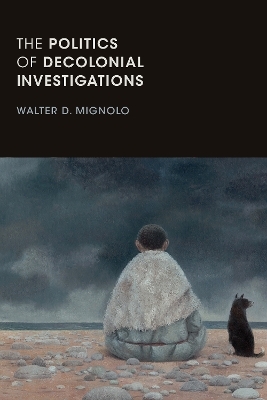
The Politics of Decolonial Investigations
Duke University Press (Verlag)
978-1-4780-0149-2 (ISBN)
In The Politics of Decolonial Investigations Walter D. Mignolo provides a sweeping examination of how coloniality has operated around the world in its myriad forms from the sixteenth century to the twenty-first. Decolonial border thinking allows Mignolo to outline how the combination of the self-fashioned narratives of Western civilization and the hegemony of Eurocentric thought served to eradicate all knowledges in non-European languages and praxes of living and being. Mignolo also traces the geopolitical origins of racialized and gendered classifications, modernity, globalization, and cosmopolitanism, placing them all within the framework of coloniality. Drawing on the work of theorists and decolonial practitioners from the Global South and the Global East, Mignolo shows how coloniality has provoked the emergence of decolonial politics initiated by delinking from all forms of Western knowledge and subjectivities. The urgent task, Mignolo stresses, is the epistemic reconstitution of categories of thought and praxes of living destituted in the very process of building Western civilization and the idea of modernity. The overcoming of the long-lasting hegemony of the West and its distorted legacies is already underway in all areas of human existence. Mignolo underscores the relevance of the politics of decolonial investigations, in and outside the academy, to liberate ourselves from canonized knowledge, ways of knowing, and praxes of living.
Walter D. Mignolo is William H. Wannamaker Professor of Romance Studies in the Trinity College of Arts and Sciences and Professor of Literature at Duke University. He is the author and editor of several books, including The Darker Side of Western Modernity: Global Futures, Decolonial Options, also published by Duke University Press.
Preface ix
Acknowledgments xxiii
Introduction 1
Part I. Geopolitics, Social Classification, and Border Thinking
1. Racism as We Sense It Today 85
2. Islamaphobia/Hispanophobia 99
3. Dispensable and Bare Lives 127
4. Decolonizing the Nation-State 154
Part II. Cosmopolitanism, Decoloniality, and Rights
5. The Many Faces of Cosmo-polis 183
6. Cosmopolitanism and the Decolonial Option 229
7. From "Human" to "Living" Rights 254
Part III. The Geopolitics of the Modern/Colonial World Order
8. Decolonial Reflections on Hemispheric Partitions 287
9. Delinking, Decoloniality, and De-Westernization 314
10. The South of the North and the West of the East 349
Part IV. Geopolitics of Knowing, the Question of the Human, and the Third Nomos of the Earth
11. Mariátegui and Gramsci in "Latin" America 381
12. Sylvia Wynter: What Does It Mean to Be Human? 420
13. Decoloniality and Phenomenology 458
14. The Rise of the Third Nomes of the Earth 483
Epilogue. Yes, We Can: Border Thinking, Pluriversality, and Colonial Differentials 531
Notes 563
Bibliography 641
Index 685
| Erscheinungsdatum | 24.08.2021 |
|---|---|
| Reihe/Serie | On Decoloniality |
| Zusatzinfo | 14 illustrations |
| Verlagsort | North Carolina |
| Sprache | englisch |
| Maße | 152 x 229 mm |
| Gewicht | 998 g |
| Themenwelt | Sachbuch/Ratgeber ► Geschichte / Politik ► Allgemeines / Lexika |
| Geisteswissenschaften ► Geschichte ► Allgemeine Geschichte | |
| Geschichte ► Teilgebiete der Geschichte ► Kulturgeschichte | |
| Geschichte ► Teilgebiete der Geschichte ► Wirtschaftsgeschichte | |
| Geisteswissenschaften ► Philosophie | |
| ISBN-10 | 1-4780-0149-6 / 1478001496 |
| ISBN-13 | 978-1-4780-0149-2 / 9781478001492 |
| Zustand | Neuware |
| Informationen gemäß Produktsicherheitsverordnung (GPSR) | |
| Haben Sie eine Frage zum Produkt? |
aus dem Bereich


